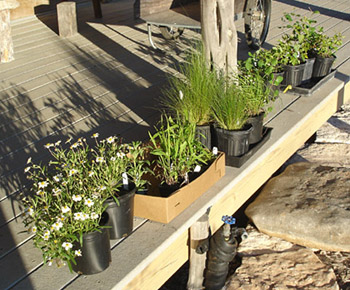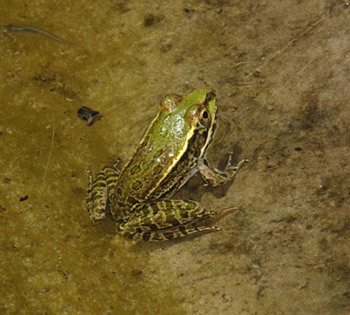- Found green worm
- Lizard digging
- Wren nesting in new Martin house
- Hummers galore
- 5 Monarch caterpillars on Antelope horn
- Planted and caged Orchid tree
- Planted in north hedge cage Chinkapin oak
Posted in
2007 Journal, Census, Habitat, Shelter
New spring plantings:

- 6 Blackfoot daisy
- 2 Sideoats gramma grass
- 1 Crossvine
- 1 Coral honeysuckle
- 2 Mealy blue sage
- 4 Mexican feather grass
- 4 Boneset
- 2 Coreopsis
Caretaker's note: Plant diversity is desirable to encourage a variety of animal species. Selections are made that are native to Texas. Plants that are deer resistant are left uncaged. Most flowering plants need to be caged to protect from deer browsing. One exception is the Blackfoot daisy (seen in the foreground of this photo).
In harsh conditions, no plants are safe from deer browse. Typically, deer avoid strong smelling leaves, like Rosemary, Lavender and Lantana.
Native plants require frequent waterings until they are well established in their new location, then they should do fine on natural rainfall.

Caretaker's note: Many frogs and tadpoles are found in the pond near the house. This juvenile has grown its legs, but the coloring on the back of its head is still in its youth phase.
Posted in
2007 Journal, Census, Habitat, Food
- Put out 1/4 pound of shade seed mix around the house
- Saw snake, 3 foot long, black
Posted in
2007 Journal, Census, Habitat
Saw Ringtail eating sunflower seeds in feeding area near house 8am
- Planted 3 Rosemary at porch posts to provide planting place for vines to protect from deer browse
- Flung seed balls in cages throughout "Spring Fling Mix" from Native Plant-Its
- 1 pound Caliche Mix (from Native American Seed) scattered and raked into ground in septic area, behind house and in field
- 1/4 pound Lemon mint seed scattered in front yard
- Red kayak and oars stolen from steps to river
- Posted "No Trespassing" signs along river trail
- Studied road water run-off below road
Posted in
2007 Journal, Census, Habitat, Erosion
Large flock of Striped-headed sparrows seen in feeding station. About 2 dozen.
Posted in
2007 Journal, Census


